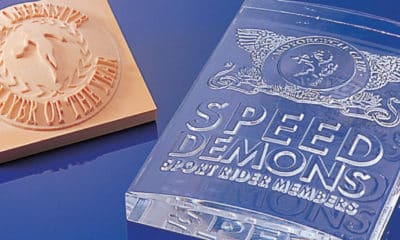Vehicles + Vinyl
In Vinyl Life, There Are No Guarantees
Signmakers should under promise and over deliver
Published
18 years agoon

A signmaker recently asked how vinyl manufacturers establish their films’ durability claims. According to him, the film makers allow themselves considerable "wiggle room." He asked, "How can a film have a durability of five to seven years? It’s either one or the other. And what does ‘up to five years’ mean? Is it a five-year vinyl, or isn’t it?" I believe vinyl manufacturers’ durability claims are merely educated guesses as to product performance under typical conditions. These guesses are based on their industry experience and various weathering tests. As sophisticated as these tests are, they can’t guarantee how a vinyl film will perform in the real world. Thus, when signmakers ask me about durability, I tell them it’s important to know more about an application and geographic location. Even with this information, accurate durability claims can be difficult. Vinyl makers can’t predict the future either, because they have no idea how signmakers and their customers will use a particular product. Despite all the testing that manufacturers conduct, they can’t test for every variable. For this reason, their warranties limit their financial exposure should problems arise. The responsibility is yours I’m not suggesting that vinyl manufacturers try to avoid their responsibilities. Rather, most film manufacturers supply replacement material even when claims aren’t justified. Although materials manufacturers are responsible for providing quality products, as the primary manufacturer, you’re responsible for selecting and testing your sign materials and determining their suitability for a particular application. Furthermore, the more you process the materials, via printing and clearcoating, the less responsible the vinyl manufacturer becomes. When numerous products are used together, determining the cause of problems becomes more difficult. In such cases, finger pointing among the raw-material companies usually increases. Carefully tell your customers about your vinyl’s durability. If a customer tries to pin you down for a warranty or guarantee, you could be entering dangerous territory. A former boss gave me some valuable advice: "Drop the word ‘guarantee’ from your vocabulary. We don’t guarantee anything. There are no guarantees in life. While we’re at it, forget ‘refund,’ too. We don’t give refunds." Moreover, be careful with any customer warranties and claims. Don’t make promises you can’t keep. It’s best to under promise and over deliver. Early in my career, I made a huge mistake by writing a very detailed warranty into a sales contract. In that written warranty, I specified that the graphics wouldn’t fade, chip, peel or crack for five years. Furthermore, I outlined the company’s remedy in the "unlikely event of a failure," which involved removing the failing graphics, and remanufacturing and reapplying the new graphics. Yep, I was young and dumb enough to put all that in writing. The ensuing learning experience was very painful. Unfortunately, the graphics didn’t quite live up to the customer’s expectations. In fact, it was a complete graphics meltdown. Within three months, the clearcoat and ink had worn off the vinyl. Poof! The printing had magically disappeared. The company claimed nothing was wrong with the vinyl, or the way it was printed or applied. The fleet owner’s washing system caused the problem. There was no product failure. However, the customer didn’t buy the vinyl company’s explanation, and the case went to court. By writing the detailed warranty, I had entered the company into a binding contract. When the graphics didn’t perform as advertised, the company was liable for a breach of contract. For that reason, the judgment favored the plaintiff. The customer received the remedy I outlined in the sales contract. Thank God for attorneys. Yes, I really mean that. And, no, I haven’t lost my mind. From working with attorneys, I’ve learned to appreciate what they can do for a business. If you have to put something in writing, a good attorney will make sure that all the "i"s are dotted and the "t"s are crossed. Implied warranties If you think you can skirt any express-warranty issues simply by not putting anything in writing, guess again. Ever hear of implied warranties? Even though you don’t provide a customer with a written warranty, one may be implied simply because you’ve made a sign for a specific application. As a sign professional, your job is to understand customers’ applications and design a graphics solution that will satisfy their requirements. The previously mentioned written warranty wasn’t the only mistake I had made. My first mistake was not conducting a thorough job survey. I knew that the buses were washed daily. But I didn’t take the time to inspect the washing system. If I had, I would’ve noticed the 8-ft.-tall, 6-ft.-diameter brushes. At that point, I might have envisioned the hollow nylon brushes abrading through the clearcoat and ink system. With such information, I could’ve engineered a better graphics solution. Instead of a clearcoat, the graphics should have contained an overlaminate. Nearly all states have adopted many of the Uniform Commercial Code’s provisions. Although the code’s purpose was to create some national uniformity for commercial transactions, each state’s statutes will likely differ. If you have questions, talk to an attorney. If you’re not a U.S. signmaker, you might assume that implied warranties are just part of the crazy American legal system. However, your country’s commercial code may be similar. In fact, Europe has its own consumer-protection laws. It does my heart good to know that friends in other lands are trying to keep up with the American Joneses. Customers have responsibilities While many laws protect consumers, a few protect manufacturers, such as signmakers. After all, without some restraints, businesses in this country could never flourish. Our customers, for example, aren’t free to misuse the signs and graphics we create for them. By instructing customers about typical do’s and don’ts, you can avoid product failures. If customers misuse a product, it’s their problem. However, don’t expect customers to admit their own negligence. Many unscrupulous customers will try to make their problems yours. Years ago, I investigated a complaint involving vinyl lettering that had peeled from several large construction signs. Not surprisingly, the construction company was demanding new signage. The signmaker was, understandably, sick at heart, because he thought he’d have to perform costly rework. We discovered, however, that the construction company had varnished all the signs, and the hot solvent in the varnish affected the vinyl’s adhesion. Because the customer misused the product, he, not the signmaker, was responsible for the damage to the signs. As a signmaker, you’re responsible for understanding your customers’ needs. However, customers have responsibilities too. Whether you’re a vinyl manufacturer or signmaker, you need to stand behind your products, within reason. Your customers should also understand the meaning of "within reason," and what is and isn’t commercially acceptable regarding vinyl graphics. Tactfully explain to your customers that the signage won’t last forever. The film you’re using might be a five- to seven-year, cast vinyl, but this doesn’t mean it won’t gradually fade and lose some of its gloss. It’s vinyl; it’s going to fade. Furthermore, no vinyl film will perform the same way in every application. It’s impossible. And it’s unreasonable to expect a vinyl manufacturer or signmaker to produce products that will satisfy every end user’s expectations. If a sign is subjected to regular spillage of acids or caustics, its vinyl will become brittle and crack — I’ll guarantee that. If a customer cleans his sign with harsh cleaning chemicals or cleaners with abrasives, or scrubs the graphics with a hard bristle brush, I guarantee he’ll damage the vinyl. What is reasonable? When customers ask about a product’s durability, they’re usually seeking assurance that the sign, or graphics, they’re buying from you will perform in a reasonable manner for their particular application. What exactly, though, does "reasonable performance" mean? This depends on the application and your understanding of the customer’s expectations. I once had a customer with a tanker fleet on the southwest side of Chicago. The company used a five- to seven-year cast vinyl for vehicle markings. Every year, it replaced its graphics. This wasn’t a product failure. This company’s tanker hauled acids and caustics. After a year of repeated spillage, the plasticizer would leach from the vinyl, and the graphics would crack. For this application, this was reasonable product performance, and the customer understood that. The company knew the marking system’s limitations, because they were explained upfront. When a product failure occurs, it’s best to remember that, usually, neither your supplier nor customer is trying cheat you. Rather, they just want a fair shake in resolving the problem.

SPONSORED VIDEO
Introducing the Sign Industry Podcast
The Sign Industry Podcast is a platform for every sign person out there — from the old-timers who bent neon and hand-lettered boats to those venturing into new technologies — we want to get their stories out for everyone to hear. Come join us and listen to stories, learn tricks or techniques, and get insights of what’s to come. We are the world’s second oldest profession. The folks who started the world’s oldest profession needed a sign.
You may like

INX Promotes Three to Vice President

6 Sports Venue Signs Deserving a Standing Ovation

Hiring Practices and Roles for Women in Sign Companies
Subscribe

Bulletins
Get the most important news and business ideas from Signs of the Times magazine's news bulletin.
Most Popular
-

 Tip Sheet4 days ago
Tip Sheet4 days agoAlways Brand Yourself and Wear Fewer Hats — Two of April’s Sign Tips
-

 Business Management2 weeks ago
Business Management2 weeks agoWhen Should Sign Companies Hire Salespeople or Fire Customers?
-

 Women in Signs2 weeks ago
Women in Signs2 weeks ago2024 Women in Signs Award Winners Excel in Diverse Roles
-

 Real Deal5 days ago
Real Deal5 days agoA Woman Sign Company Owner Confronts a Sexist Wholesaler
-

 Benchmarks17 hours ago
Benchmarks17 hours ago6 Sports Venue Signs Deserving a Standing Ovation
-

 Editor's Note1 week ago
Editor's Note1 week agoWhy We Still Need the Women in Signs Award
-

 Line Time2 weeks ago
Line Time2 weeks agoOne Less Thing to Do for Sign Customers
-

 Product Buying + Technology1 week ago
Product Buying + Technology1 week agoADA Signs and More Uses for Engraving Machines














